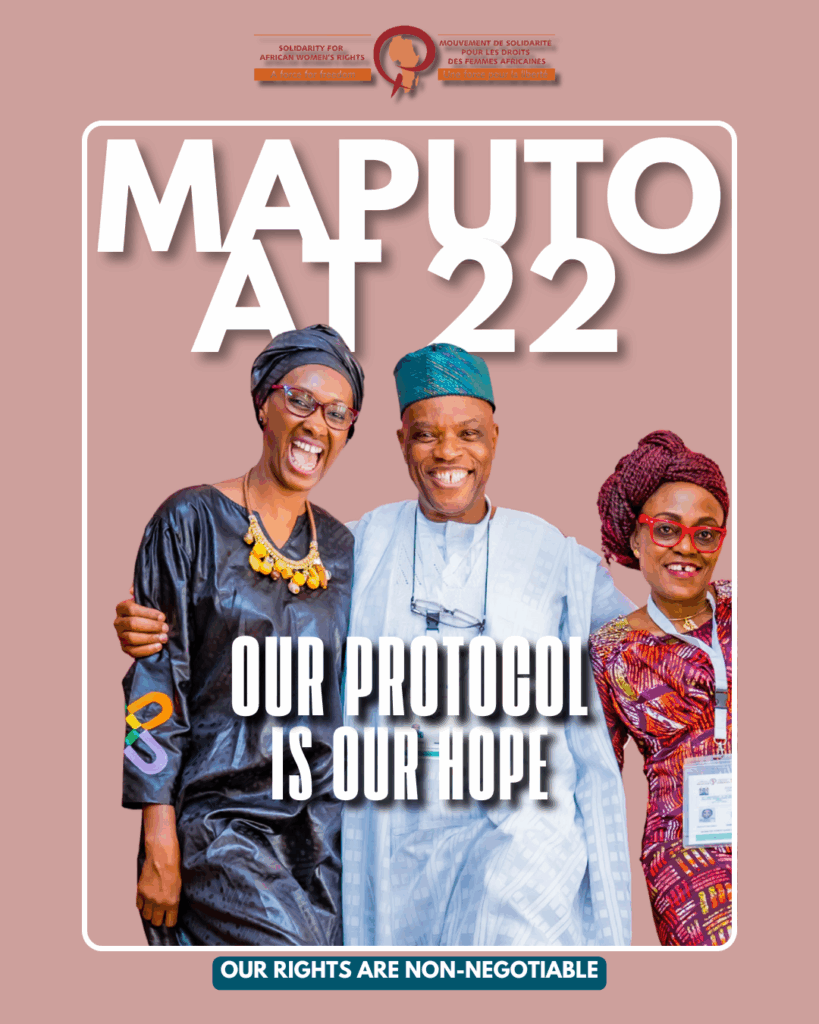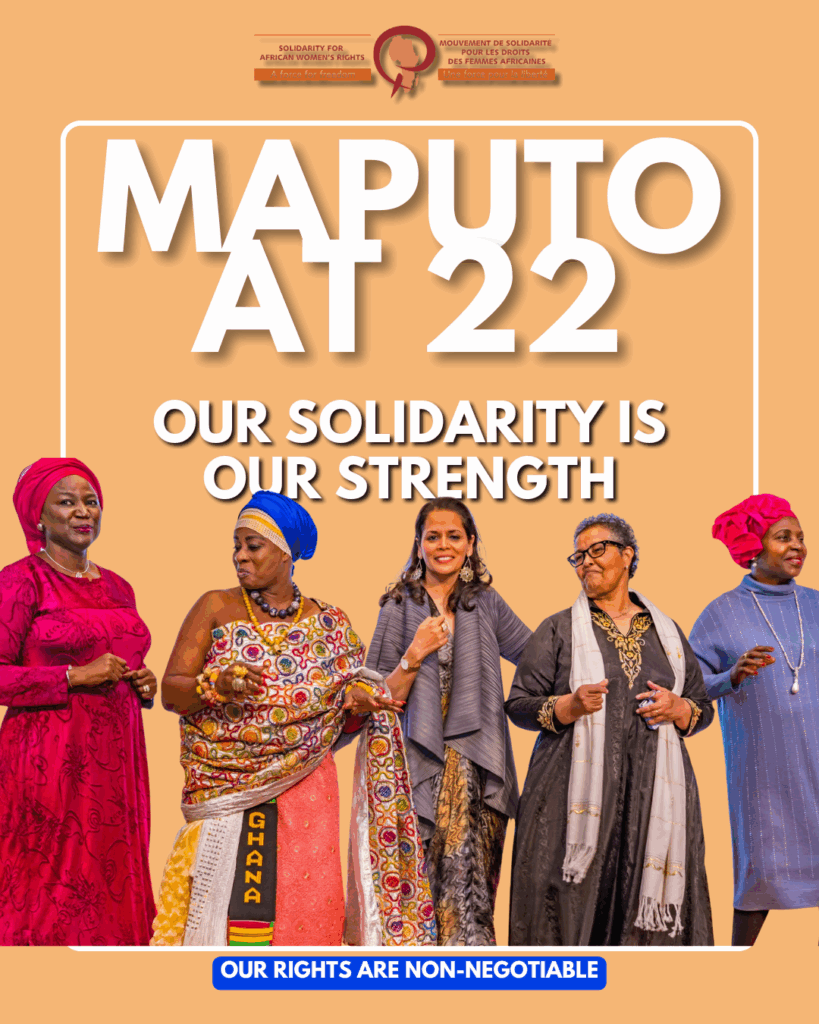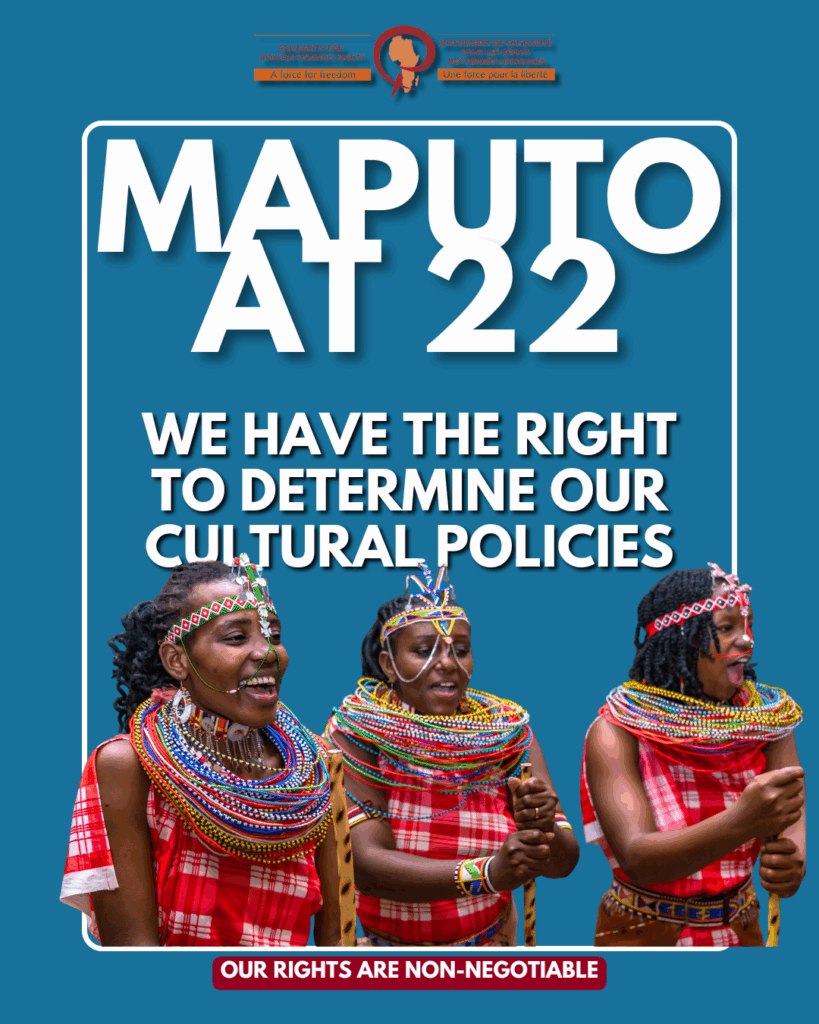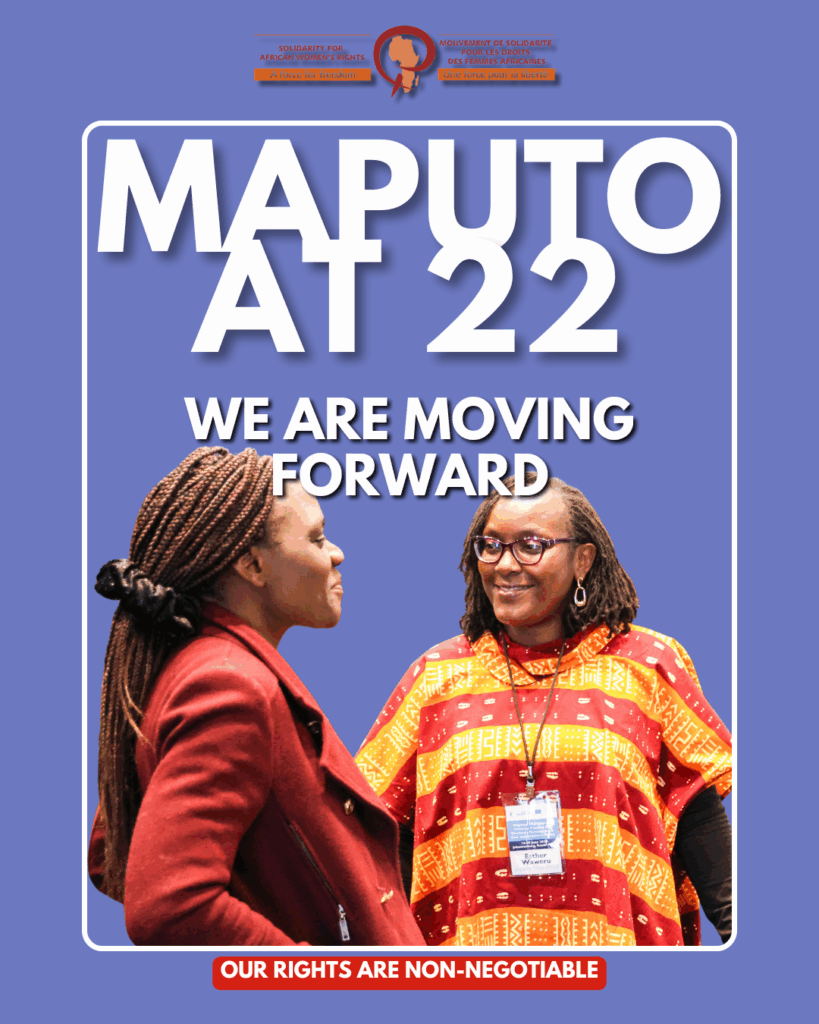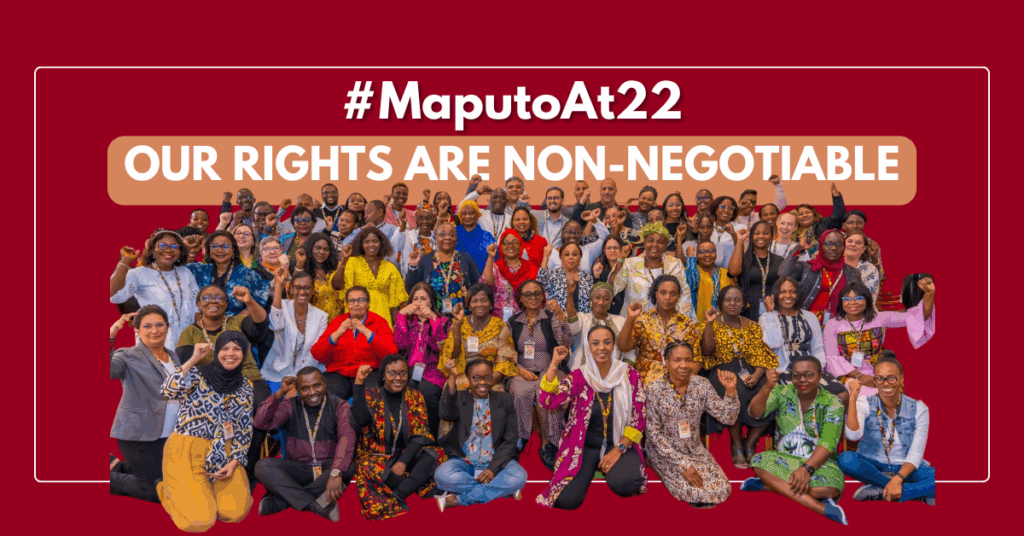Today, on 11 July 2025, we mark 22 years since the adoption of the Protocol to the African Charter on Human and Peoples’ Rights on the Rights of Women in Africa, also known as the ‘Maputo Protocol’: a landmark moment in Africa’s legal and political history. But this year’s commemoration comes at a time when the rights enshrined in the Protocol are facing new and intensifying threats.
From rising violence and regressive laws to coordinated attacks on bodily autonomy and women’s rights defenders, the gains hard-won by African women’s movements are under siege.
But the SOAWR Coalition is not backing down.
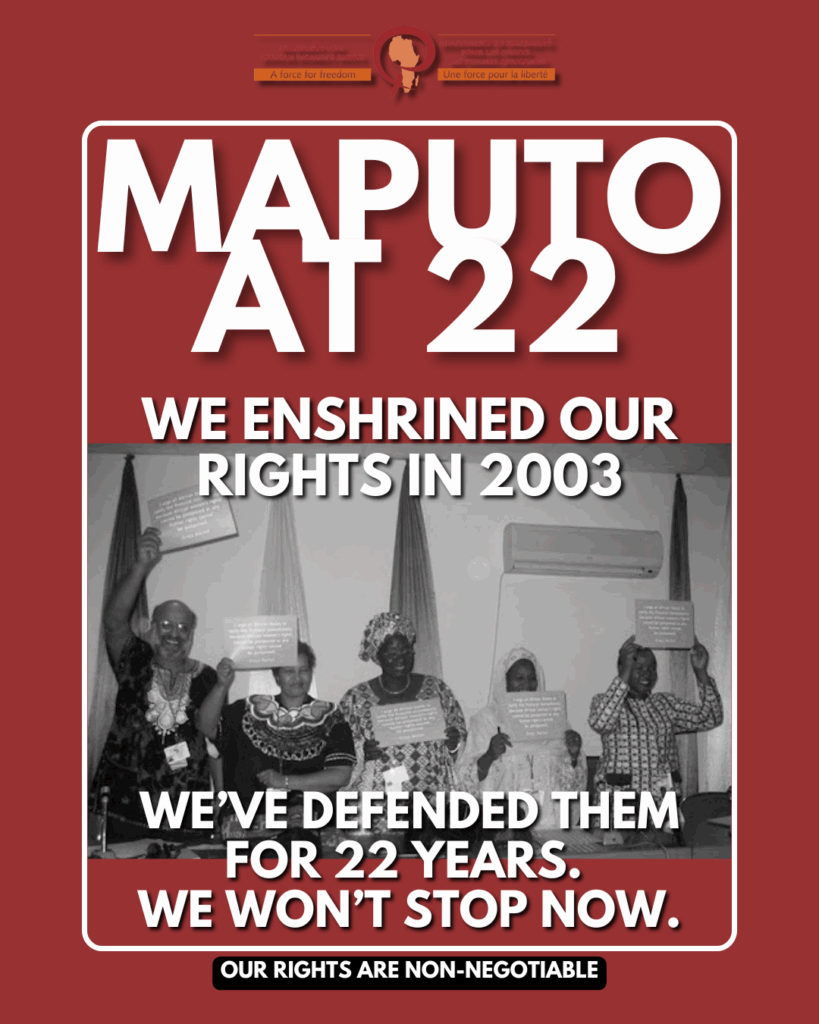
Globally and across Africa, women’s rights are under threat
In March 2025, the United Nations Economic and Social Council summarised the observed forms of backlash against women’s rights:
“In recent years, backsliding on gender equality policies has at times been explicit, where normative commitments have been removed. More often, however, it has been implicit, where a subtle erosion of commitments takes place, “hollowing out” policies without changing legislation or policy. Such measures can include discrediting gender equality as a legitimate goal; reframing existing policies, such as on education or health, in ways that restrict women’s rights; undermining institutional mechanisms, including national gender equality machineries; and limiting accountability and inclusion mechanisms for women’s rights organizations. Whether explicit or implicit, such rollbacks violate human rights commitments and the principle of non-retrogression”.
The Maputo Protocol is a critical driver of progress, yet its implementation is increasingly underfunded and politically sidelined. At the same time, overlapping crises such as the continued fallout from COVID-19, economic instability, and conflict have deepened violence against women and girls, while online spaces have amplified harmful masculinities and misogynistic narratives. Together, these trends reflect an intensifying and well-coordinated backlash that threatens to reverse hard-won gains.
African women and girls continue to face high rates of gender-based violence, harmful practices, and restricted access to sexual and reproductive health care. Women’s rights movements and organisations are being defunded and having to use minimal funding resisting these forms of backlash rather than being free to focus on their original mandates; at the same time, policy and civic space for women’s rights organisations is shrinking.
Despite this, SOAWR and our partners continue to defend, organise, and resist.
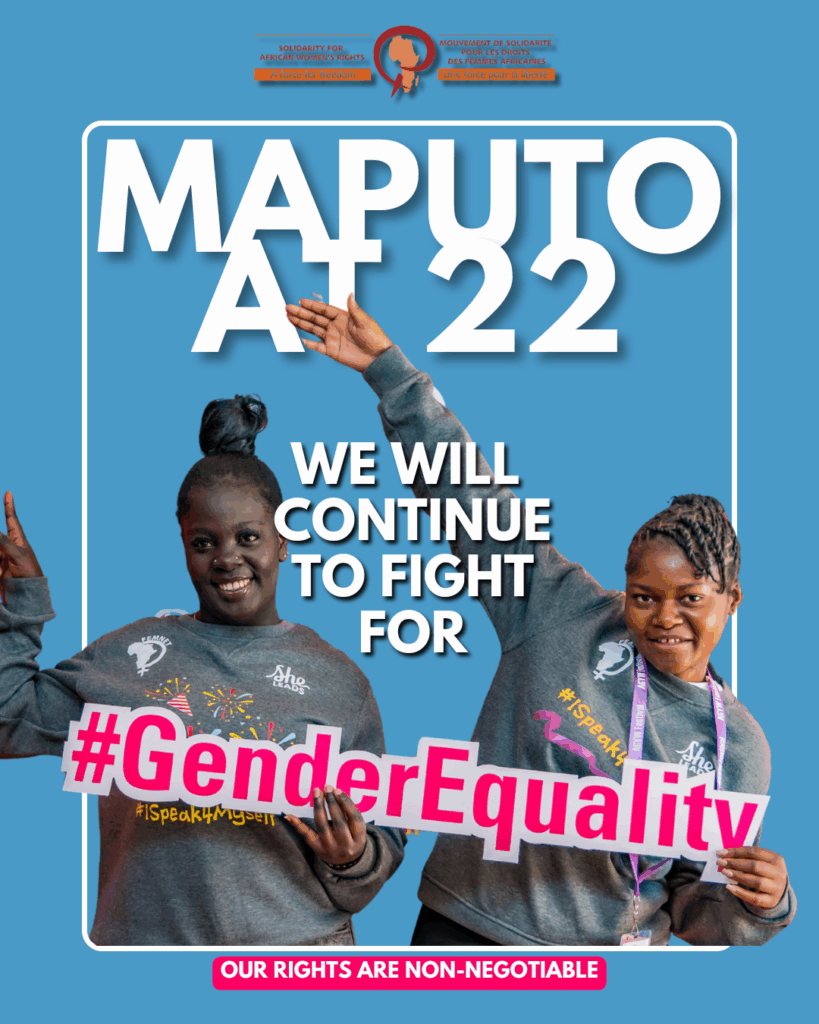
The Maputo Protocol is our shield and our power
Adopted in 2003, the Maputo Protocol remains Africa’s most comprehensive legal framework for the realisation of women’s rights. It is not just a legal document – it is a powerful African feminist response to inequality, injustice, and violence.
Over the past 5 years, the Protocol has continued to be used in courts across the continent to hold governments to account, to set important legal precedence and to secure justice for African women and girls.
For example:
In 2019, South Africa’s Constitutional Court made a significant ruling in a case involving two men accused of gang rape (Tshabalala & Ntuli v The State). The men argued they could not be convicted because they did not physically commit the rape themselves. However, the court disagreed and ruled that those who assist or act as part of a rape can be held fully responsible for the crime. In its judgment, the court referred to Article 4 of the Maputo Protocol, which obliges states to protect women’s right to dignity and freedom from violence. This decision helped close a loophole in the law and ensured greater accountability for all those involved in acts of sexual violence.
In 2020, Kenya’s High Court heard a case involving a government appointment panel that included five people — only one of whom was a woman (Bernard Odero Okello & another v Cabinet Secretary for Industrialisation). The court ruled that this violated the Constitution and the Maputo Protocol, specifically Article 2, which prohibits all forms of discrimination against women. The judgment reinforced the importance of gender balance in public leadership and decision-making roles and required the government to ensure women are fairly represented in all appointments.
In a 2021 case in Malawi (State oao HM on behalf of CM v Queen Elizabeth Hospital), a girl who had a failed abortion was denied emergency medical treatment at a public hospital. Her guardian took the case to court, arguing that the hospital violated her rights. The court agreed, stating that denying post-abortion care violated the right to health and life. The ruling cited Article 14 of the Maputo Protocol, which protects women’s reproductive rights, including access to safe abortion and post-abortion care. This case set a clear example that health institutions must provide essential care, regardless of abortion status.
Beyond the courtroom, SOAWR members have continued to push back against attempts to reverse progress:
In The Gambia, a historic collective effort successfully defended the Women’s (Amendment) Act 2015 — which criminalises female genital mutilation (FGM) — from repeal. SOAWR member African Centre for Democracy and Human Rights Studies (ACDHRS) mobilised civil society, engaged policymakers, and worked closely with religious leaders and community groups to build broad-based support for upholding the anti-FGM law. Their advocacy helped counter misinformation, protect activists from intimidation, and reinforce calls for enforcement — playing a central role in the National Assembly’s decision to reject the repeal bill in July 2024.
SOAWR member Equality Now also played a key role by leading a targeted media advocacy campaign that amplified the voices of survivors and highlighted the real-life harms of FGM. They provided technical support to local civil society groups including GAMCOTRAP, TANGO, and the Network Against Gender-Based Violence, while also raising the issue internationally — including at the UN Human Rights Council, where former Gambian Vice-President Dr Isatou Touray called for global solidarity. However, despite this significant victory, the anti-FGM law faces a renewed threat: in April 2025, the Supreme Court affirmed it would hear a constitutional challenge to the Act, with the case scheduled for July. Equality Now continues to support local legal teams, including FLAG, to defend the law once again.
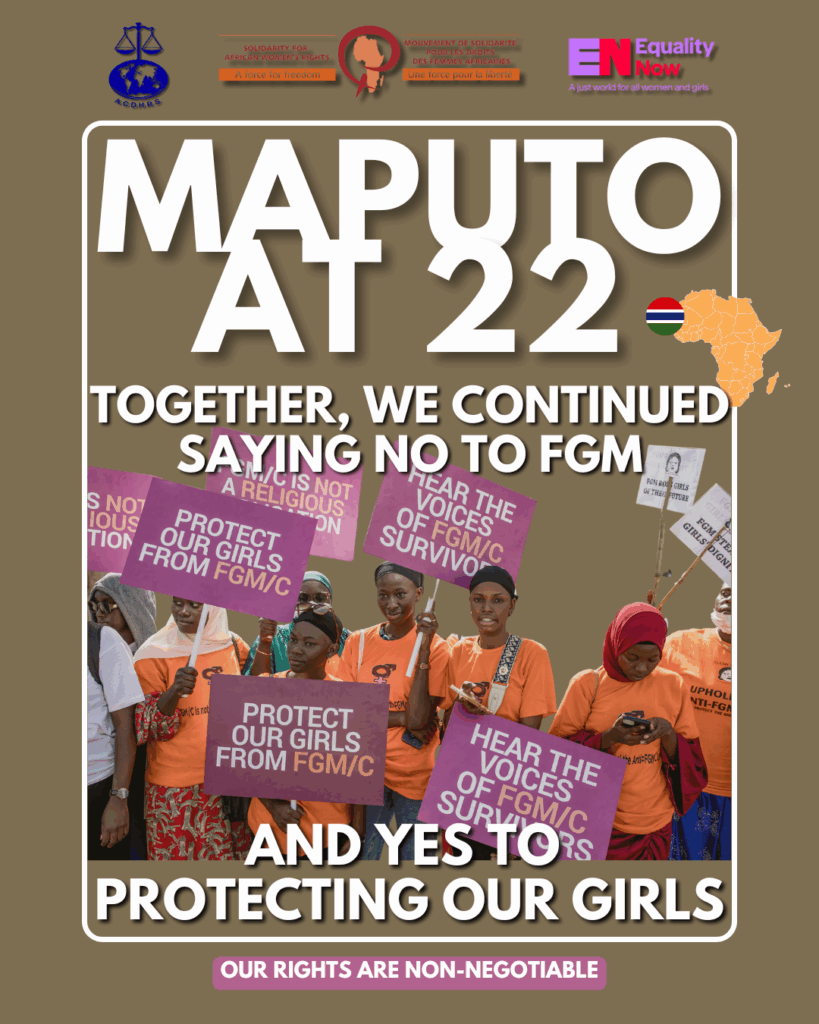
In Nigeria, SOAWR members Alliances for Africa (Afa), Baobab for Women’s Human Rights and Women’s Rights Advancement and Protection Alternative (WRAPA) actively opposed a proposed repeal of the 2015 Violence Against Persons Prohibition (VAPP) Act, a vital legal instrument protecting against gender-based violence. At the 81st Session of the African Commission on Human and Peoples’ Rights, the SOAWR Coalition warned that repealing the law would reverse critical gains for women’s rights and safety across federal and state levels. Our advocacy called for inclusive stakeholder dialogue and urged the African Commission to press Nigeria to uphold and fully implement the VAPP Act. As a result of these efforts and others, the proposed repeal did not proceed — although challenges remain in ensuring the law’s full enforcement.
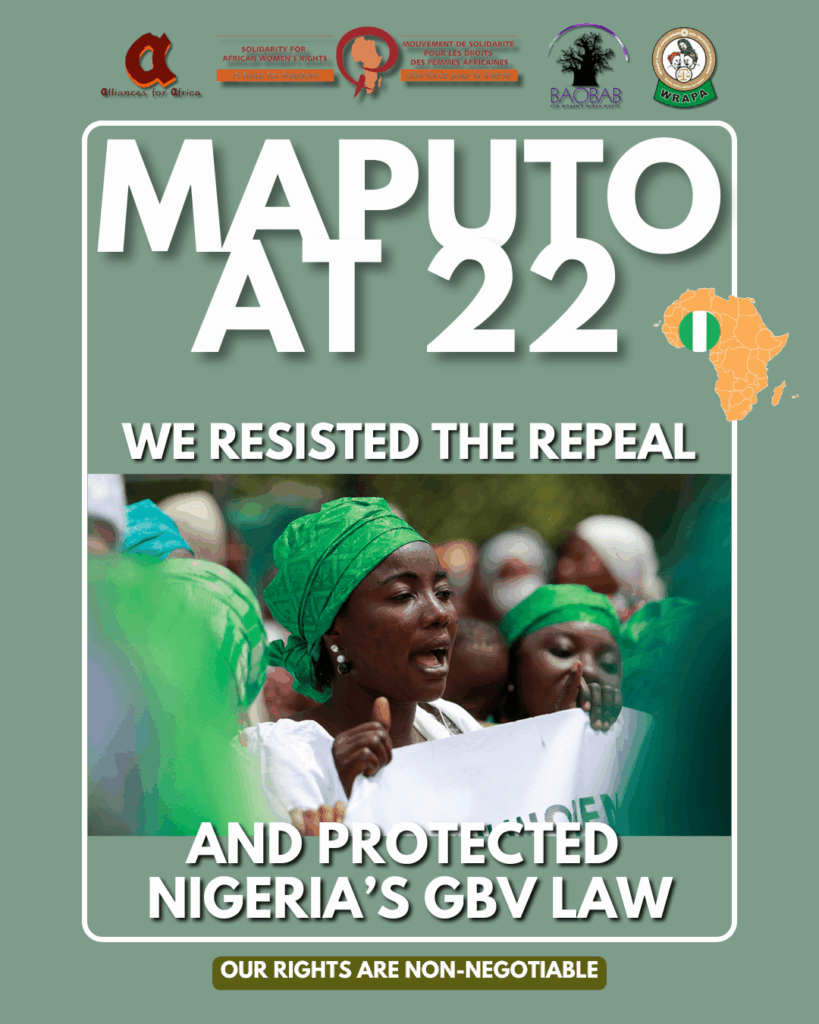
In Rwanda, SOAWR member Great Lakes Initiative for Human Rights and Development (GLIHD) played a leading role in advancing reproductive rights using the Maputo Protocol. In 2017, GLIHD filed a public interest case before the Supreme Court, challenging restrictive provisions in the penal code that criminalised abortion and required a court order to access safe abortion services. Their legal advocacy contributed to the 2018 revision of the Penal Code, which expanded grounds for legal abortion and removed the court order requirement.
GLIHD also submitted a shadow report on the Maputo Protocol — with a focus on Article 14 (Health and Reproductive Rights) — and a parallel report to CEDAW, many of whose recommendations were later echoed in government feedback. These efforts laid the groundwork for a major policy shift: in April 2019, the President of Rwanda granted clemency to 367 women and girls imprisoned for abortion, complicity in abortion, or infanticide. GLIHD’s Executive Director, Tom Mulisa, welcomed the move but called for deeper systemic reforms to address the continued criminalisation of women for seeking health services — particularly in cases of miscarriage or misapplied charges of infanticide.
This Rwandan example shows how the Maputo Protocol can not only influence law reform, but also deliver real, life-changing results for women through advocacy rooted in African human rights frameworks.
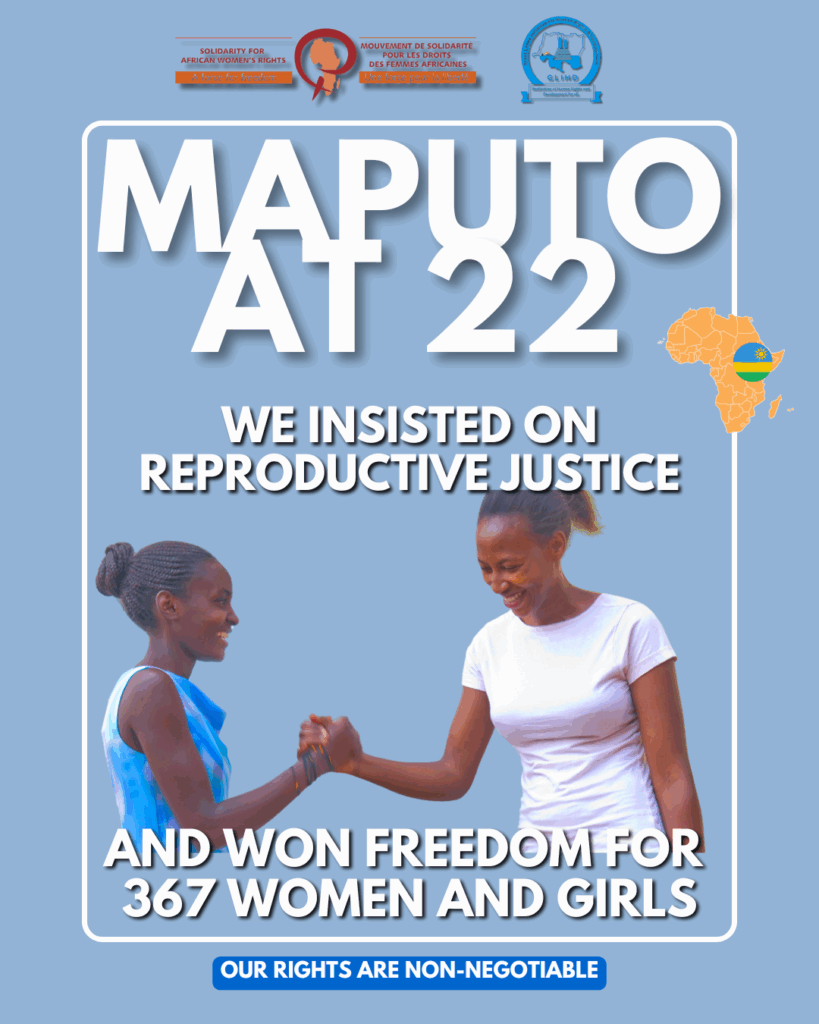
These cases remind us: the Maputo Protocol is not just a promise — it is a living, breathing framework for resistance, built and defended by women’s movements across the continent.
Now more than ever, we must use it, protect it — and fund it
Despite the utilisation of the Protocol in the majority of African Union (AU) member states, 22 years later, 10 member states still have not ratified it: Egypt and Morocco have never signed the Protocol; Burundi, Chad, Eritrea, Madagascar, Niger, Somalia and Sudan have signed but not yet ratified; and the Central African Republic ratified the Maputo Protocol on the 10th of May 2012 but is yet to deposit the original instrument of ratification to the African Union Commission. Further, many member states have maintained their reservations on articles, such as on Sexual and Reproductive Health Rights and rights relating to marriage and divorce.
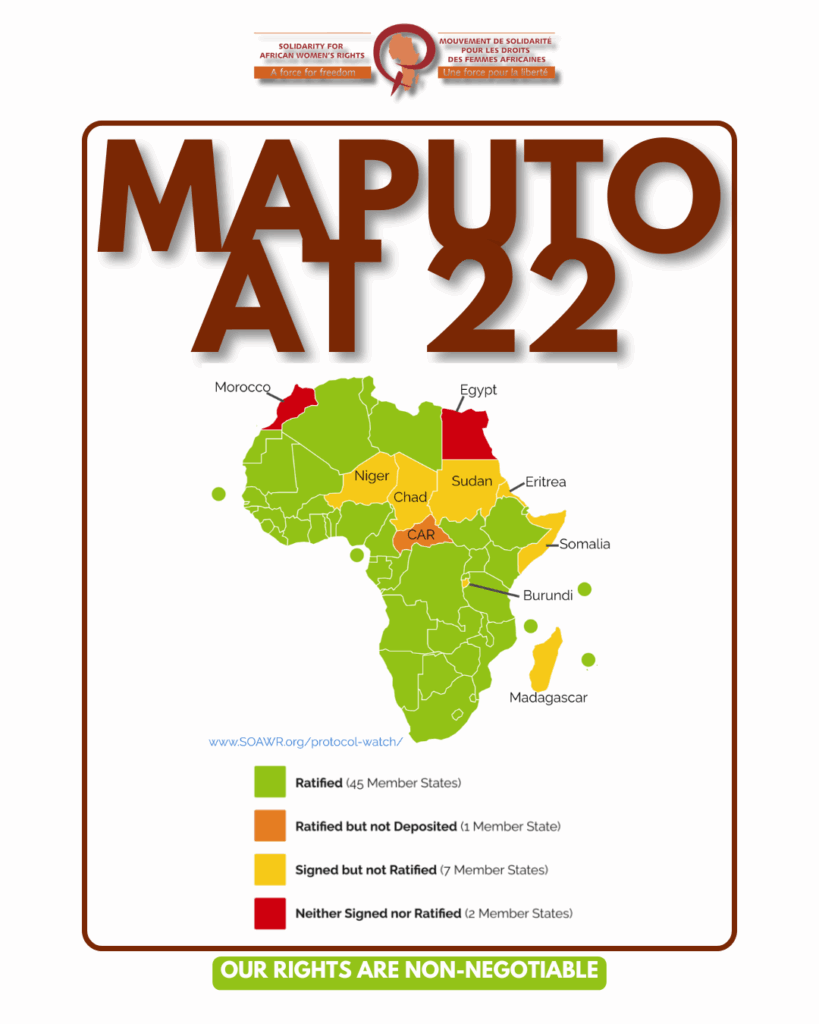
Positively, for those that have ratified, many have successfully domesticated the rights into its national legislation, policies and institutions, which you can read about in SOAWR’s Maputo At 20: Where are we now? report. However, these often fall short in fully implementing the Protocol’s provisions, with budget allocations remaining dangerously low and a major barrier. In a review conducted by the UN in 2024-2025, they found that globally, “only half (52%) of states reported that their gender machineries were provided with adequate financial resources and staff capacity to fulfil their mandates.”
Further complicating the work of African women’s rights movements to hold governments to account to their mandates in the Maputo Protocol, AWID’s Where Is The Money? survey also found that the median annual budgets of women’s rights organisations and feminist movements have effectively declined over the past decade, dropping to just $22,000 in 2023. Most funding remains project-based, restricted, and short-term, typically lasting no more than 12 months. Worryingly, 64% of feminist groups could operate for less than six months if external funding were cut in 2024, and nearly 50% had already faced the risk of closure. The continued under-resourcing of WROs and movements significantly limits their ability to operate, demand accountability and drive policy change.
Meanwhile, the anti-rights backlash is well-funded and coordinated; our resistance must be proportionally resourced.
SOAWR therefore calls for:
- The remaining 10 AU member states to urgently ratify the Maputo Protocol and for all member states to lift their reservations.
- All AU member states to fully domesticate and implement the Maputo Protocol’s provisions — not just in law, but in lived reality.
- African Governments to back their gender equality and equity commitments with dedicated budgets and clear accountability mechanisms.
- Funders to increase long-term, core and flexible funding for African women’s rights movements.
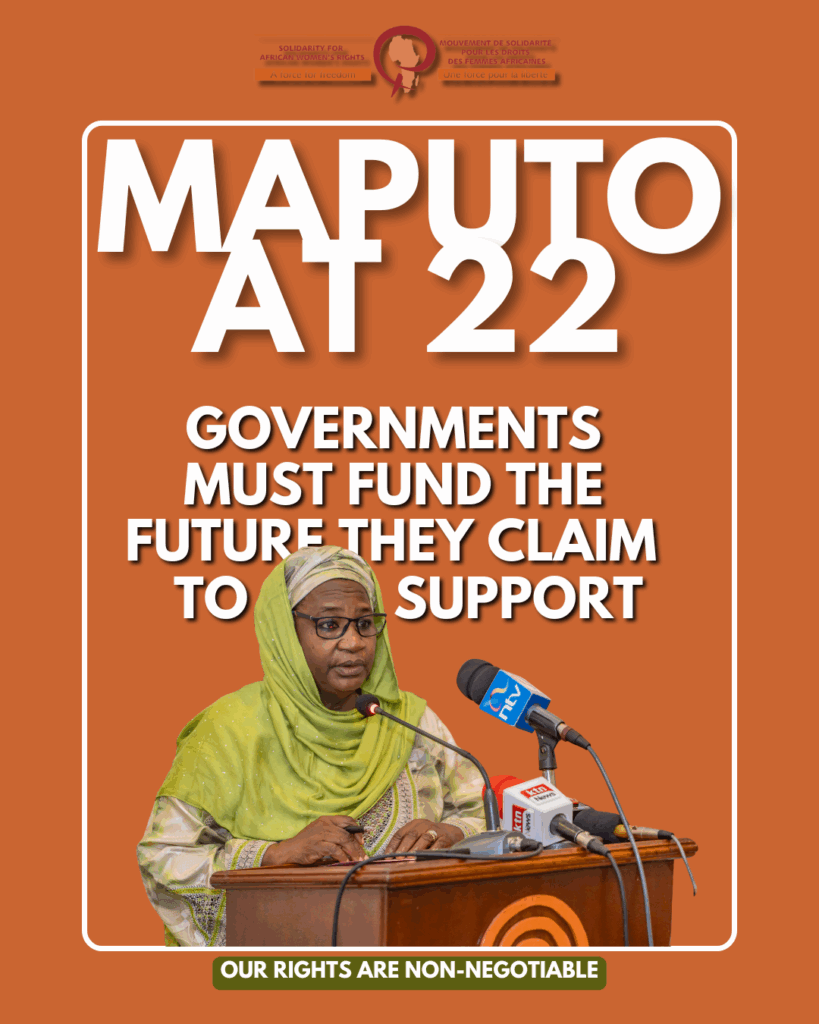
The Maputo Protocol is our tool for hope and progress
Amidst the backlash, the Maputo Protocol remains a visionary blueprint for a just and equitable Africa. It enshrines not only protection, but possibility — a future where African women and girls live free from violence, with the power to decide, to lead, and to thrive.
As outlined in the Maputo Protocol Toolkit for Young Change-Makers, the Protocol envisions the following reality:
- Women of all backgrounds, especially those in rural and marginalised communities, are at the forefront of decision-making in climate policies, land management, and renewable energy development.
- The economic value of women’s unpaid care work is recognised and valued, with adequate paid maternity leave becoming the norm
- From rural councils to international forums, the African continent shines as a global model of participatory democracy, proving that equal representation is not just a moral imperative but the foundation for resilience and success.
- African women’s active participation in peace processes leads to a lasting and stable peace across the continent. Their leadership, integral to conflict resolution and decision-making, ensures that peace agreements are not only inclusive but sustainable—resulting in fewer wars, less violence, and stronger, more cohesive communities.
- Legal frameworks unequivocally support access to safe abortion, ensuring no woman is forced to resort to unsafe alternatives. Dignity, health and freedom for every woman and girl are the norm, not the exception.
- Men and boys actively advocate against violence, standing as allies in breaking cycles of abuse and promoting lasting social transformation. Grandchildren and great-grandchildren struggle to fathom how violence against women and girls was ever tolerated, their lives shaped by a world that treasures dignity and the unshakable safety of all its members.
- Culture continues to thrive and is celebrated, with traditions and practices that enrich communities, but no longer at the expense of women’s rights or wellbeing.
- Women with disabilities are no longer marginalised, but are seen as leaders, innovators and contributors to their communities, their voices amplified in policymaking and governance.
- Gender-sensitive education and public awareness campaigns have transformed social attitudes, fostering a culture where discrimination is no longer tolerated or practiced. With the reform of discriminatory laws, women no longer struggle to assert their rights, but confidently take their place as full citizens, creators, and leaders in their communities.
This is not merely a dream – it is a continental commitment, signed and ratified by the majority of African Union member states. It is ours to defend and realise.
In solidarity, we resist
SOAWR celebrates 22 years of the Maputo Protocol by amplifying our collective resistance and reminding the world: our rights are not up for negotiation. Not now. Not ever.
In hope and solidarity,
The SOAWR Coalition
